
Water is the lifeblood of any successful farm, and efficient irrigation is key to maximizing yields and minimizing waste. A rain gauge from Tractor Supply provides a simple yet powerful tool for achieving this goal. This guide will walk you through choosing, setting up, and effectively using a rain gauge to optimize your farm’s water management practices. Did you know that precise irrigation can lead to a 20% increase in crop yield? For more information on Tractor Supply rain gauges, check out this helpful resource.
Choosing the Right Rain Gauge at Tractor Supply
Tractor Supply offers a variety of rain gauges, each with its own features. Selecting the right one depends on your specific needs and budget. Consider these factors:
- Accuracy: Look for gauges with clear, easy-to-read markings and a proven track record of accuracy. Precise measurements contribute to effective irrigation management.
- Durability: The gauge will be exposed to the elements. Choose a durable model made from materials like sturdy plastic or metal to withstand harsh weather conditions. A long-lasting gauge saves you money in the long run.
- Size: Larger gauges are generally easier to read but less portable. Smaller gauges are easier to move but might require more careful observation.
- Mounting Style: Some gauges are freestanding, while others require mounting on a post or fence. Decide on the best placement for your farm before purchasing.
Setting Up Your Rain Gauge: A Simple, 3-Step Process
Proper placement is crucial for accurate rainfall readings. Follow these three steps for optimal results:
- Find Level Ground: Select a flat, level area free of obstructions (trees, buildings, tall plants) that could interfere with rainfall collection.
- Ensure Accessibility: Place the gauge in a location that allows for easy and regular observation and measurement.
- Consider Wind Protection: While a completely sheltered location isn't essential, minimizing exposure to strong winds will improve the accuracy of your readings.
Understanding and Utilizing Your Rain Gauge Data
Your rain gauge provides real-time data on rainfall, crucial for informed irrigation decisions. Regularly checking your gauge allows you to:
- Avoid Overwatering: This conserves precious water resources and prevents damage to your crops from waterlogging.
- Prevent Underwater: This ensures that your plants receive the necessary hydration for optimal growth and yield.
- Optimize Irrigation: By assessing your rainfall alongside your usual irrigation schedule, you can adjust watering to ensure your crops receive the ideal amount of water.
Integrating Your Rain Gauge with Other Tools for Enhanced Accuracy
Combining your rain gauge with other tools like soil moisture sensors provides a more holistic view of your farm's water needs. Soil moisture sensors measure the water content of the soil directly, complementing the rainfall data from your gauge. This allows for even more precise irrigation adjustments, leading to higher efficiency and yields. Wouldn't you rather know precisely how much each plant needs?
Example: Applying Rain Gauge Data to Optimize Water Usage
Imagine your rain gauge reports 0.75 inches of rain this week, and your irrigation plan calls for 1.5 inches. Based on this information, you need to supplement with only 0.75 inches of water – a 50% reduction in your water usage!
Your Action Plan: A Step-by-Step Guide to Smarter Irrigation
| Step | Goal | Expected Outcome |
|---|---|---|
| Purchase a rain gauge from Tractor Supply | Obtain accurate rainfall measurements | Improved data-driven irrigation decisions |
| Regularly record rainfall data | Establish a baseline rainfall pattern | Optimize watering based on actual rainfall |
| Integrate with additional sensors (optional) | Refine irrigation based on soil moisture | Achieve precise water management, maximizing yield |
Key Takeaways: Rain Gauges and Sustainable Farming
- Real-time Data: Rain gauges provide crucial, real-time information on rainfall amounts.
- Water Conservation: Utilizing this data helps optimize irrigation, minimizing water waste.
- Improved Yields: Efficient water management directly contributes to healthier crops and higher yields.
- Cost Savings: Reduced water consumption translates to lower utility bills.
Remember, consistent observation and data-driven adjustments are key. Investing in a rain gauge from Tractor Supply is a small step toward significantly enhancing the sustainability and profitability of your farm. Start watering smarter today!